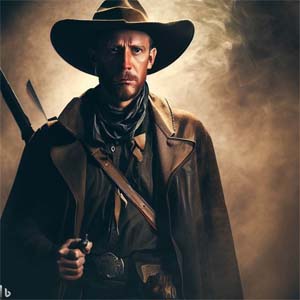Introduction
In the realm of psychology, Carl Jung’s theory of archetypes provides a fascinating exploration of universal patterns and symbols that reside within the collective unconscious of humankind. Among the diverse array of archetypes, the Outlaw stands as a powerful and enigmatic figure, representing rebellion, freedom, and a refusal to conform to societal norms. This archetype encapsulates the essence of those individuals who question authority, challenge established rules, and dare to explore the uncharted territories of human existence. This article delves into the multifaceted nature of the Outlaw archetype, examining its origins, characteristics, and significance in contemporary society.
Understanding Archetypes and the Collective Unconscious
Carl Jung, the Swiss psychiatrist and founder of analytical psychology, posited the existence of a collective unconscious—a reservoir of shared experiences, symbols, and patterns that are inherited across generations. Archetypes, which arise from the collective unconscious, are primordial images and motifs that emerge repeatedly in myths, dreams, and cultural expressions. These archetypes serve as universal templates that shape human behavior and provide a framework for understanding the complexities of the human psyche.
The Outlaw Archetype: Origins and Symbolism
The Outlaw archetype has its roots deeply embedded in the human psyche and finds expression in various mythologies, folktales, and historical narratives. From the mythic figure of Prometheus to the legendary Robin Hood, the Outlaw archetype emerges as a symbol of defiance against oppressive forces, a champion of the marginalized, and a harbinger of social change.
Characteristics of the Outlaw Archetype
Individuals embodying the Outlaw archetype exhibit a unique set of characteristics that distinguish them from the rest of society. Some notable traits associated with this archetype include:
Rebellion: Outlaws defy societal norms and established rules, often engaging in acts that challenge the existing power structures. They reject conformity and seek to dismantle oppressive systems.
Independence: They value personal freedom and autonomy above all else. Outlaws refuse to be constrained by societal expectations and are willing to pay the price for their nonconformity.
Courage: Outlaws possess an unwavering determination and bravery to confront the status quo, even at the risk of facing punishment or isolation. They fearlessly question authority and advocate for change.
Resourcefulness: Often operating on the fringes of society, Outlaws possess resourcefulness and adaptability. They find creative ways to survive and thrive, utilizing unconventional methods to achieve their goals.
Social Justice: While Outlaws may be seen as outcasts, they champion the cause of the underprivileged and fight for social justice. They stand up against injustice and embody the voice of the voiceless.
The Outlaw Archetype in Modern Society
In contemporary society, the Outlaw archetype continues to exert its influence, albeit in different forms. From political activists challenging oppressive regimes to whistleblowers exposing corruption, these modern-day Outlaws defy conventions and inspire change. Artists, writers, and musicians often embody the Outlaw archetype, using their creative expression to challenge societal norms and provoke thought.
However, it is important to note that the Outlaw archetype can have both positive and negative manifestations. While some Outlaws fight for noble causes and challenge unjust systems, others may resort to criminal activities or become destructive forces. Understanding the archetype helps us navigate the nuances and appreciate the transformative potential of the Outlaw.
Embracing the Outlaw Within
Recognizing and integrating the Outlaw archetype within ourselves can be a powerful journey of self-discovery and personal growth. By embracing our rebellious spirit and questioning the structures that confine us, we can tap into our innate potential for transformation. It is through the exploration of our shadow selves and embracing the archetype’s positive potential that we can effect change in our lives and in society.
To fully embody the Outlaw archetype, one must be willing to challenge their own beliefs and societal conditioning. It requires the courage to question the status quo, even when faced with opposition or ostracization. By stepping outside the boundaries of what is deemed acceptable, individuals can forge their own paths, exploring uncharted territories and pushing the limits of human potential.
However, it is crucial to navigate the expression of the Outlaw archetype with a sense of responsibility and ethical consideration. Blind rebellion and disregard for the well-being of others can lead to chaos and harm. The Outlaw’s quest for justice and freedom should be balanced with empathy and a genuine concern for the greater good.
In popular culture, the Outlaw archetype often finds representation in literary works, films, and other forms of media. Characters like Han Solo from “Star Wars,” Lisbeth Salander from “The Girl with the Dragon Tattoo,” or even the anti-hero Walter White from “Breaking Bad” embody different aspects of the Outlaw archetype. These characters captivate audiences by defying societal norms, challenging authority, and embodying the struggle between light and dark.
Ultimately, the Outlaw archetype serves as a reminder that societal progress often hinges on those willing to question and challenge established norms. By embracing the rebellious spirit within, individuals can contribute to positive change, dismantle oppressive systems, and strive for a more just and equitable society.
In conclusion:
The Outlaw archetype represents a powerful force within the human psyche that defies boundaries, challenges conformity, and advocates for change. Through rebellion, independence, courage, resourcefulness, and a commitment to social justice, the Outlaw archetype inspires individuals to question authority, challenge oppressive systems, and strive for a more equitable world. By understanding and embracing this archetype, we can tap into our own transformative potential and contribute to positive societal change. The Outlaw archetype reminds us that it is through our collective rebellious spirit that we can shape a better future for ourselves and generations to come.
Hits: 41

